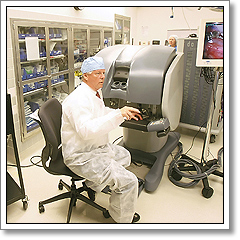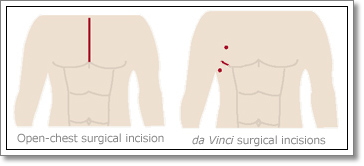Minimally Invasive Heart Surgery
 What is Minimally Invasive Heart Surgery?
What is Minimally Invasive Heart Surgery?
Minimally invasive surgery refers to a variety of surgical techniques designed to decrease the impact of open heart surgery on a patient. Some techniques are designed to use a smaller operating "window," which is the opening to the heart that the surgeon uses to perform the operation. These techniques frequently involve the use of cutting-edge technologies that have only recently become available, including robotic heart surgery. Other techniques are designed to avoid the use of the heart-lung machine, which does the work of the heart and lungs while the heart is stopped.
Our heart surgeons utilize minimally invasive techniques with the following surgical procedures:
- Minimally invasive coronary bypass surgery
- Robotic assisted heart valve surgery
- Minimally invasive atrial fibrillation surgery
- Endoscopic vein harvesting
Benefits of Minimally Invasive Heart Surgery
 The two primary benefits of minimally invasive heart surgery are smaller incision sizes and avoiding the use of the heart-lung machine. The use of smaller incisions results in decreased scar size, less pain, and shorter recovery time after heart surgery. Patients may be discharged from the hospital in 2 to 3 days, compared to the typical 5 to 10 days after traditional open heart surgery.
The two primary benefits of minimally invasive heart surgery are smaller incision sizes and avoiding the use of the heart-lung machine. The use of smaller incisions results in decreased scar size, less pain, and shorter recovery time after heart surgery. Patients may be discharged from the hospital in 2 to 3 days, compared to the typical 5 to 10 days after traditional open heart surgery.
Benefits from off-pump bypass surgery include lower risks of complications that are associated with the heart-lung machine. These include stroke, kidney damage, and bleeding. Off-Pump CABG surgery may be used in patients with other significant medical problems that will not tolerate the heart-lung machine, and may decrease cognitive decline after surgery.
Risks of Minimally Invasive Heart Surgery
The major drawback of a smaller incision is that the operation is technically more difficult because the surgeon does not have as much access to the heart and visibility may be limited. For this reason, not all operations are possible with minimally invasive heart surgery. Many patients are not candidates due to additional medical problems. Finally, many procedures have the best outcome with a traditional open heart technique, and a minimally invasive approach is not possible without placing the patient at an increased risk of complications.
There are increased risks with off-pump bypass surgery, which is why the procedure is not performed on all individuals. The main problem is that the surgeon has less access to all the blood vessels of the heart, and may not be able to perform bypasses of all the coronary arteries that need to have blood flow restored. Other risks of off-pump bypass surgery include brain injury if not enough blood flows to the brain, irregular heart rhythms, and lower blood pressure during surgery. Patients who are younger or have very small vessels that need to be bypassed are not good candidates for off-pump bypass surgery.
Is Minimally Invasive Heart Surgery Right for Me?
Our heart surgeons attempt to perform minimally invasive surgery whenever technically possible and in the best interest of the patient. They continually train with the newest technologies so that if a patient is a candidate for minimally invasive heart surgery, our surgeons have the technical skill and experience to perform the operation. Your surgeon will perform a detailed evaluation of your records and condition to determine if you are a candidate for minimally invasive heart surgery. As with all heart surgery, your personal preferences will be involved in the decision making process.
The information on this page is meant to provide a background for an informed discussion with a surgeon. If you have more questions regarding minimally invasive bypass surgery, please contact us to schedule an appointment with one of our surgeons.
 Email Article
Email Article 

